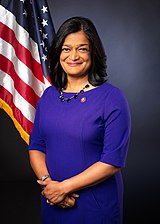Congressional Progressive Caucus
[10] The founding CPC members were concerned about the economic hardship imposed by the deepening recession and the growing inequality brought about by the timidity of the Democratic Party response in the early 1990s.
On January 3, 1995, at a standing room only news conference on Capitol Hill, they were the first group inside Congress to chart a comprehensive legislative alternative to U.S. speaker Newt Gingrich and the Republican Contract with America.
[11] The CPC advocates "a universal, high-quality, Medicare for All health care system for all", living wage laws, reductions in military expenditure, a crackdown on corporate greed, putting an end to mass incarceration, supporting and implementing swift measures to start reversing climate change, immigration policies that are humane, and reparations.
[13] Two of its proponents stated: "By implementing a fair tax code, by building a resilient American economy, and by bringing our troops home, we achieve a budget surplus of over $30 billion by 2021 and we end up with a debt that is less than 65% of our GDP.
[17][18][19] On February 27, 2021, the Democratic-controlled House passed the American Rescue Plan pandemic relief package, which included a gradual minimum wage increase to $15 per hour.
[21] Five weeks after the 2024 elections, Caucus chair-elect Greg Casar connected "serious discontent" with the Democratic Party to the "2008 housing crash", as manifested in Occupy Wall Street and certain aims for movements such as Black Lives Matter.
"[22] In a subsequent interview, the Texas labor advocate admitted that "the Democratic brand has been damaged" and outlined the Progressive Caucus strategy for a "rebrand.
"[23] Casar observed that, during the 2024 electoral campaigns, Republicans focused on "targeting and scapegoating a group of vulnerable people in order to make it sound like, in Middle America, that is all the Democratic Party works on and cares about."
In response to such stories promulgated across the aisle, "we should point out that it wasn’t a trans person that denied your health insurance claim; it was a gigantic corporation that went unregulated by the Republicans.
[31] In 2019, the CPC challenged House speaker Nancy Pelosi regarding the details of a drug-pricing bill, the Elijah Cummings Lower Drug Costs Now Act.
[38][39] A prominent 2019 attempt to get legislation passed for a Green New Deal was sponsored by Rep. Alexandria Ocasio-Cortez (D-NY) and Sen. Ed Markey (D-MA) during the 116th United States Congress, though it failed to advance in the Senate.
[40] Green New Deal proposals call for public policy to address climate change along with achieving other social aims like job creation and reducing economic inequality.
The name refers back to the New Deal, a set of social and economic reforms and public works projects undertaken by President Franklin D. Roosevelt in response to the Great Depression.
On November 14, 2022, a group of bipartisan senators, including Rob Portman (R-OH), Kyrsten Sinema (D-AZ), Thom Tillis (R-NC), Tammy Baldwin (D-WI), and Susan Collins (R-ME) announced they had reached an amendment compromise to include language for religious protections and clarify that the bill did not legalize polygamous marriage.
[49] All 50 Democratic senators and 12 Republicans (Roy Blunt, Richard Burr, Shelley Moore Capito, Susan Collins, Joni Ernst, Cynthia Lummis, Lisa Murkowski, Rob Portman, Mitt Romney, Dan Sullivan, Thom Tillis, and Todd Young) voted in favor of advancing the bill.
[52][53] Twenty Democrats led by Summer Lee and Greg Casar, who was recently elected to lead the Congressional Caucus next year, are calling for support for U.S. legislation that would ban arming countries that block humanitarian aid.


